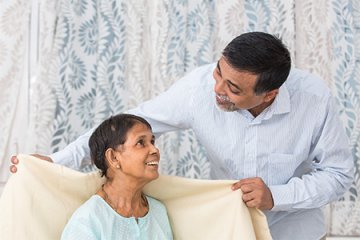16.09.2020
Advices for guardians
The older the child, the more embarrassing it is for him that his physiological functions don’t work the way they are supposed to. Regardless whether the episodes of incontinence happen at night, or urine loss occurs also during the day, parents play an important part in this situation. They should do everything to help the child not to isolate from their environment because of their condition, and they should relieve the child from the feeling of guilt.
The atmosphere created by the parents and the child’s environment concerning this subject matter will have an impact on the child’s entire future.
One can observe the following in children who wet themselves:
- low self-esteem
- contempt for one’s body
- fear that someone might find out
- fear of rejection and humiliation
- lack of self-acceptance
- difficulties at learning
- terrors, neurosis
- withdrawal from the environment or violent behaviour
- avoiding contact with peers
- reluctance to go out.
First of all it is necessary to satisfy the child’s need of support and acceptance, and it’s important to understand the situation the child is in.
What can you do to help?
At home
- Remain calm and provide support – children can sense the adult’s mood and easily share the emotions, both good and bad.
- Don’t make your child feel guilty – it doesn’t wet itself on purpose nor to make you angry or spite you.
- Never make fun of your child and don’t use its condition against the child – you humiliate your child and you show your helplessness.
- Be sincere – explain that you understand the child’s feelings and that this situation is difficult for you as well, but you will be able to go through it together.
- Think positive and help your child do the same – this is really important in the case of motivational treatment.
- Make sure the child drinks enough fluids – cutting down on drinking will not improve the child’s state but can be a threat to its health.
- Remind the child to void the bladder, make sure it goes to the toilet before going to bed.
- Praise your child for each day and night it manages to stay dry.
- Don’t punish your child if it wets the bed. Have an extra set of bedclothes and a pair of pyjamas at hand in case that happens.
- Protect the bed from wetness – buy a special barrier sheet or a hygienic bed underpad.
- Provide your child with absorbent products – it will make it feel comfortable and secure.
Outside
- If you are taking your child to the doctor make sure it knows how the visit is going to look like, what questions might be asked, and what is the purpose of the visit. Explain that the child mustn’t be ashamed of the doctor, who is there for him only to help the situation.
- Encourage your child to play with its peers. Make the child feel secure by the use of disposable absorbent underwear such as Seni Active.
- If the child is a bit older it is worth to show it a picture of the urinary system and explain how it works. Ask a doctor or a nurse for help – the child will surely appreciate your effort of trying to explain what is wrong with its body.
- If your child goes to school make sure to acknowledge the teacher about the problem so there is always an adult who can provide support.
- Put an extra pair of absorbent underwear in your child’s schoolbag. It is best to pack it in a discreet wrapping which won’t raise the peers’ suspicion.
- Don’t resign from sending your child to summer camps or trips. Encourage it to take part in such events and let the child know that you believe that it can handle the situation. Supply the child with absorbent products and let the guardian know about the problem, so he or she can provide support when the child needs it.

